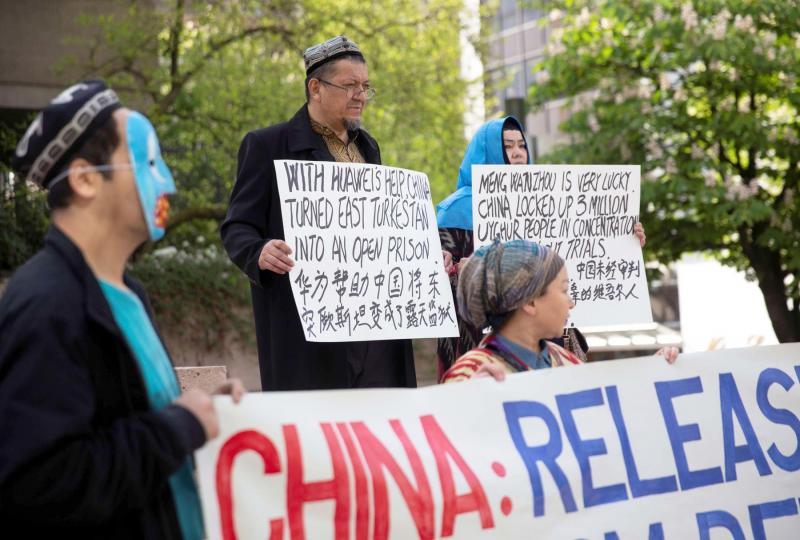Secular versus sacred: Uighurs are in a hard place

Little interest. People hold signs protesting China’s treatment of the Uighur people outside of British Columbia Supreme Court building in Vancouver, British Columbia, Canada, May 8. (Reuters)
Trump’s America is engaged in trade negotiations with China and is unwilling to add the Uighurs to a long list of difficult issues.
Much of the world, including Arab countries, stays silent on accusations that China is waging a campaign of assimilation against Uighur Muslims. The sultan of Brunei announces, after weeks of an international outcry, that a strict new interpretation of sharia won’t be fully enforced.
Both developments challenge the common argument advanced by Islamophobes and Islamist extremists. They say there is no separation in Islam between secular and sacred. In fact, the separation is often maintained by Muslim leaders against all odds, simply to govern.
The most notable example in the 20th century came after the 1979 Iranian Revolution, which enshrined sharia as the law of the newly christened Islamic Republic. However, by 1988, Ayatollah Ruhollah Khomeini found it necessary to release the government from the commands of sharia in “the public interest” (maslaha) because conservative clerics obstructed legislation on the grounds it didn’t conform to sharia. They objected to land redistribution and labour contract laws that regulated conditions, wages, safety and holidays.
They were holding up the business of government and Khomeini responded with a creative formula. He deemed the Islamic state “a branch of the absolute trusteeship of the Prophet… (one that) constitutes one of the primary ordinances of Islam, which has precedence over all other derived ordinances, such as prayer, fasting and pilgrimage.” That is to say, the government is free to abrogate provisions of the law if it judges it necessary to the public interest.
It was a remarkable move and did not conform to the general view advanced by radical Islamists and Western theorists partial to the clash-of-civilisations position. Both argue that Islam is impervious to secularisation, it is a total “civilisation,” in fact a “total discourse,” in the words of the scholar Ernest Gellner.
In fact, though, as Khomeini demonstrated, Muslim leaders routinely govern by secular rationale. Some of that is on view with respect to international issues. The Uighurs are a case in point.
A UN panel, as well as human rights organisations, said that China’s Uighur minority is being persecuted for its faith, with at least 1 million forced into “re-education” camps, while the rest of the Uighur population endures relentless and intrusive surveillance.
Muslim leaders have offered little or no criticism of the alleged mistreatment of their co-religionists in China. Foreign ministers of the 57-member Organisation of Islamic Cooperation actually praised China in March for “providing care to its Muslim citizens.” In February, Saudi Crown Prince Mohammed bin Salman bin Abdulaziz defended China’s “right” to crack down on its Muslim citizens “for its national security.”
Imran Khan, prime minister of Pakistan, which borders Xinjiang, home to the Uighurs, said: “Frankly, I don’t know much about” what’s happening to the Uighurs. Indonesian President Joko Widodo also expressed ignorance. Turkey is the only Muslim country to have condemned China’s treatment of the Uighurs as “a great embarrassment for humanity.”
The non-Muslim world has not been a great deal more vocal either. The European Union has spoken up and Sweden pledged to grant refugee status to all Uighurs. The US response has been patchy. The strongest statement came from Randall Schriver, who leads Asia policy at the US Defence Department. He recently described the Uighur situation as tantamount to imprisonment in “concentration camps,” a comment that incensed Beijing.
US Secretary of State Mike Pompeo has called for an end to the “abhorrent” practice of detaining Uighurs in camps but Pompeo’s boss, US President Donald Trump, has neither tweeted nor mooted his favourite threat — sanctions — on behalf of the Uighurs.
This is not particularly surprising. Trump is not known for championing Muslim causes but there is another reason, too, and it plugs into the way Arab and other Muslim leaders are behaving.
Trump’s America is engaged in trade negotiations with China and is unwilling to add the Uighurs to a long list of difficult issues. Much of the Arab and Muslim world takes a similar pragmatic position with respect to China, the world’s second largest economy. China has money to invest (through its sweeping 65-country Belt and Road Initiative) and money to buy oil and other necessaries. It hungers to expand its global footprint and is increasingly seen as a counterpoint to the United States.
In the circumstances, there is little appetite to cross China. As Sophie Richardson, China director for Human Rights Watch, recently pointed out: “It’s hard to muster any response at all.”
American pragmatism — hard, unfeeling — is running along the same lines as that of the Arab and Muslim world, which shows that secular spaces exist in governance in Muslim countries just as much as anywhere else.

